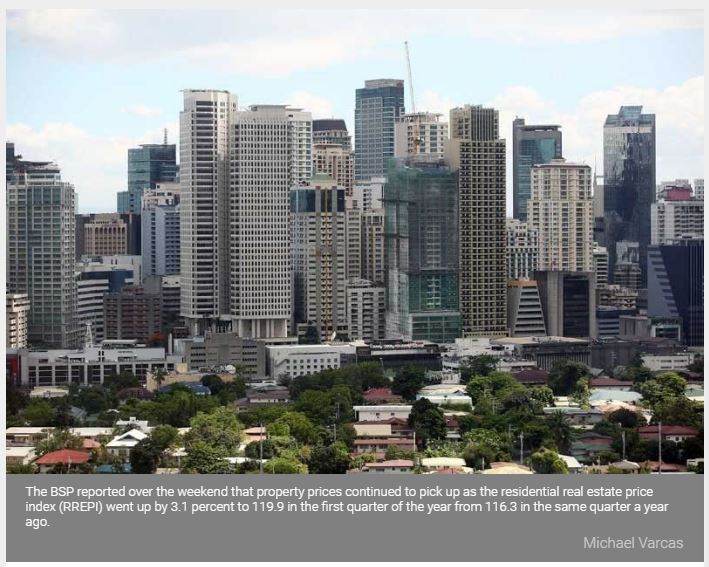Philippines: Property prices up for 7th straight quarter
MANILA, Philippines — The cost of acquiring homes rose for the seventh straight quarter in the first three months this year after a series of interest rate hikes by the Bangko Sentral ng Pilipinas (BSP) last year to curb rising inflationary pressures.
The BSP reported over the weekend that property prices continued to pick up as the residential real estate price index (RREPI) went up by 3.1 percent to 119.9 in the first quarter of the year from 116.3 in the same quarter a year ago.
The RREPI measures the average change in prices of various types of housing units based on data from housing loans granted by universal, commercial, and thrift banks.
The RREPI has been rising since the second quarter of 2017.
The BSP said prices of condominium units and townhouses grew by 10.9 percent and 9.6 percent, respectively, year-on-year, while prices of duplex units and single-detached housing units decreased by eight percent and 1.7 percent, respectively.
The RREPI was also higher by 1.6 percent versus the fourth quarter of last year.
The BSP said residential property prices were higher in both the National Capital Region (NCR) and areas outside NCR.
The average residential property prices in both NCR and areas outside NCR went up by 8.7 percent and 0.4 percent, respectively, compared to year-ago prices.
“In NCR, the rise in the average residential property prices was largely due to the increase in the prices of condominium units. In areas outside NCR, all types of housing units registered price increases, except for single detached houses, which recorded a decline,” it said.
For the first quarter, seven in 10 or 74 percent residential real estate loans (RRELs) were for the acquisition of new housing units.
By type of housing unit, 46.2 percent of residential property loans were for the purchase of single detached units followed by condominium units with 44.5 percent, and townhouses with 8.6 percent.
By area, majority of the loans granted in the NCR were for the purchase of condominium units, while loans granted in areas outside NCR were for single detached houses.
The BSP placed the real estate and project finance exposures of Philippine banks under tight watch after debt watchers and multilateral lending agencies raised the red flag over the possible overheating in the economy,
The BSP has approved enhancements to the prudential reporting requirements in order to strengthen oversight of banks’ real estate and project finance exposures.
The reportorial enhancements form part of BSP’s macroprudential toolkit and would give the regulator a better grasp of the extent and quality of exposures of big banks to project finance, especially since demand for project finance is expected to increase and gain further traction as the country moves towards achieving its infrastructure goals.
Source: https://www.philstar.com/business/2019/07/01/1930821/property-prices-7th-straight-quarter#VwOLujOKa98U4WKY.99


 Thailand
Thailand




